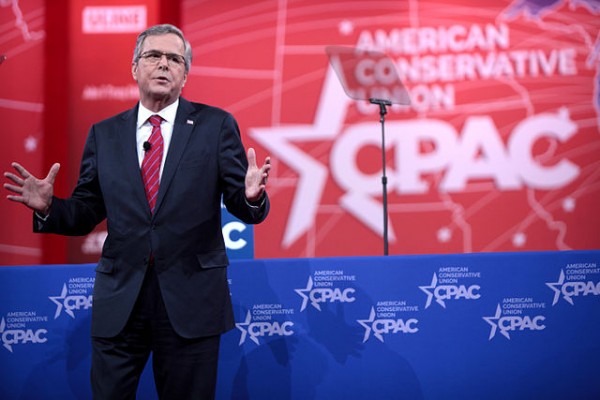
Jeb Bush speaking at CPAC 2015 in Washington, DC. Photo Credit: Gage Skidmore
Years ago, a few friends and I were walking down the streets of Sorrento, Italy, during some off-time on a class trip abroad. Few paid any attention to the teenage tourists — at least until one man stopped, did a double take and asked, “Are you from the United States?”
“Yes,” one of us said. “Massachusetts.”
“One question. Did you vote for George W. Bush?”
“We can’t vote yet, but we don’t support him either.”
We were all around 13- or 14-years-old, so voting was out of the question. He was pleased. We walked on.
Twelve years later, Jeb Bush has found himself grappling with a similar question on a trip Europe. That is, will Jeb follow in the footsteps of his father or his brother?
That’s a question that resonates stateside as well, but in Europe the need to choose either the 41st or the 43rd president as a source of inspiration is a bit more pressing. Thanks to his support for German reunification, George H.W. Bush remains popular in Western Europe; meanwhile, his son, George W., is likely the least popular American president in Europe since the end of World War II. One poll from 2006 found that a staggering 77 percent of Europeans disapproved of George W.’s foreign policy during his first and second terms.
Jeb’s strategy for avoiding being bogged down by his brother’s own failures appears to be shifting the conversation from his family’s political history to that of an old-but-new common enemy: Russia.
Upon his arrival to Germany on Tuesday, Jeb spoke before the Christian Democratic Union’s economic council in Berlin. He emphasized the need for strong transatlantic ties, took potshots at the Obama administration’s Russia policy, and called for a more aggressive response from the West against Russian President Vladimir Putin’s invasion of Ukraine.
“Giving the sense that we’re reacting in a tepid fashion only enables the bad behavior of Putin,” Jeb told an audience of a thousand or so.
“We should never [respond] in a way that pushes Russia away for a generation of time. Then ultimately, Russia needs to be a European nation and that everything we do ought to be to isolate its corrupt leadership from its people, for starters.”
That message of aggression may appeal to leaders in the next two stops on Jeb’s European adventure — Poland and Estonia — but it’s not necessarily wooing German leaders. German Chancellor Angela Merkel, who has had to wrangle sanctions skeptics like Cyprus, Greece and Italy, would undoubtedly appreciate some recognition of her efforts. Were tougher sanctions against Russia to be implemented — which G7 leaders showed support for this week — she’d have to do more of the same.
Yet, as Leonid Bershidsky, a Bloomberg View columnist, noted, “[Jeb’s] compliment to Merkel for her toughness on sanctions against Russia sounded like faint praise, once he warned against ‘tepid’ reaction to President Vladimir Putin’s ‘bad behavior.'” She’s too entwined with the U.S.’ Russia policy for Jeb’s “tepid” line to work.
The question of arming the Ukraine is also a contentious one. Jeb, like most of the Republican hopefuls, supports the idea. The administration’s “tepid” response presumably alludes to Obama’s unwillingness to embrace the idea. That said, Obama hasn’t ruled the possibility out either. Merkel, meanwhile, has made her views quite clear: Sending arms to Ukraine would not solve the crisis.
If Jeb’s European charm offensive rests on winning over German leaders with an aggressive anti-Putin agenda, he’s out of luck. Not all hope may be lost, though — at least someone admitted he’s better than his brother.
This post also appeared at The Eastern Project.